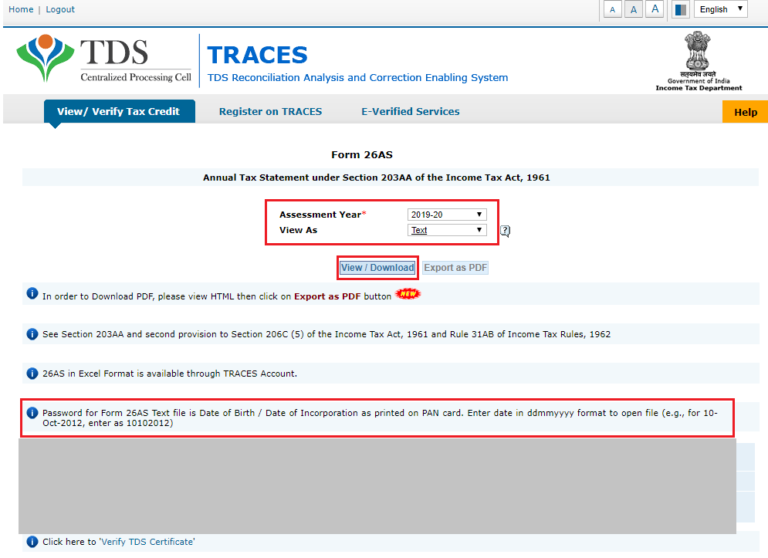You can use your Form 26AS to see if you have any transactions flagged as “High-Value Transactions”. Entities such as Banks and other Financial Institutes are responsible to furnish certain transaction details through Form 61A (Annual Information Return). With an aim to curb black money and to track high-value transactions, the government has implemented new reporting guidelines. Therefore, “High-value transactions” of Individuals and Businesses are monitored u/s 285BA of The Income Tax Act.
Steps to track High Value Transactions
- Log in to the Income Tax e-Filing Portal
Visit the Income Tax e-Filing portal and login using valid credentials.
- Click on “My accounts“
Select View Form 26AS (Tax credit) Option

- View Tax Credit Statement
Click on the option to proceed which will redirect you to the TRACES portal.

- Agree usage and acceptance of form 16
Click on the checkbox and then proceed.

- Option to view the form
Now you can click on the option to view the annual information statement.

- Enter the required details
Enter the assessment year and choose the type of file you wish to download. The downloaded file will be password protected and the password is your Birth date.

- Lastly, you can look at Part E
It has the details of AIR Transaction in the downloaded file.

FAQs
FVU created by NSDL is a program to verify the format of AIR submitted by filers and to measure its accuracy. FVU will accept AIR submissions only if it is error-free. If there are any errors in the details an error code and error description and details about the error will be displayed. You can resubmit your form after correcting the errors. If there remains no error in filing AIR then the “File Validation Successful” message pops up.
Well, If any Individual/Business makes a Financial Transaction which can be considered as “High valued Transactions”. Then the Bank and other Financial Institutes have to report the transaction with the registered PAN of that Person. Hence, ITD can come to know about your “High valued Transactions”
AIR can be furnished through Form 61A (Part B) in a digitized form in a CD/Floppy. While Form 61A (Part A) in a paper format duly signed.


Hey @TeamQuicko
Thanks for the blog! Just one quick question - Why do we have to report a quarterly breakdown of Dividend Income under IFOS?
Thank you!
Hey @TanyaChopra
This quarterly breakdown of Dividend Income under IFOS will help to calculate and determine penalty u/s 234C for the delay in payment of Advance Tax.
Hope this helps!
I had received dividend recently but I had noticed that TDS had been deducted. any idea as to why has it happened and is there a way I can claim this TDS?
Hey @HarshitShah
After the introduction of Budget 2020, dividend income is now taxable in the hands of the shareholder; and is also subject to TDS at 10% in excess of INR 5000 u/s 194 & 194K. Foreign Dividend is taxable at slab rates. TDS is not applicable to such dividends. The taxpayer should report such income under the head IFOS in the ITR filed on the Income Tax Website.
Hope this helps!
Hey @HarishMehta
Yes, dividend income is now taxable from FY 2021-22 onwards and it has to be reported under the head of IFOS.
You can read more about it here:
Hi @Maulik_Padh,
You need to pay Income tax on the net taxable income, i.e. after subtracting deductions, expenses, etc.
If the net taxable income is negative i.e. if there is loss, you can carry it forward when filing the ITR
Here are some of the articles which might help
Hi @ameyj
The amount of TDS deducted shall reflect in your Form 26AS only and it will also reflect the name of the deductor.
Using the name of the deductor you can find out on which share you have received the dividend and you can also cross-check the same in your bank statement.
Yes, you are right, TDS is to be deducted when the dividend paid exceeds 5000 INR in a financial year. However, the 5,000 INR limit pertains to all the dividends an individual gets in a year, or the total dividend per shareholder that a company pays out in a year, is left to interpretation, and hence registrars and share transfer agents (RTA) are not taking any chances and are deducting TDS even on small amounts.
Hope this helps
Hi @ameyj
You can submit a grievance on Income Tax Portal mentioning the issue and also attach the 26AS.
The other option is to leave it as it is and clarify it when the tax department sends the notice.
Hi @TeamQuicko
Consider that I have 10 shares each of 10 different Indian companies. Each of the 10 companies are declaring a dividend of INR 100 before the FY ends. Now I will be recieving 1000 as dividend from each company, thereby a total of 10,000.
The 5,000 dividend limit, is it applicable to each company / total dividend recieved by me in a year. If it is applicable to each company, then I would not attract TDS of 10% for dividend.
Also pl clarify, how would the company B know that I have got shares of Company A,C,D,E so on…
@Saad_C @Laxmi_Navlani @Divya_Singhvi @Kaushal_Soni @AkashJhaveri can you help with this?